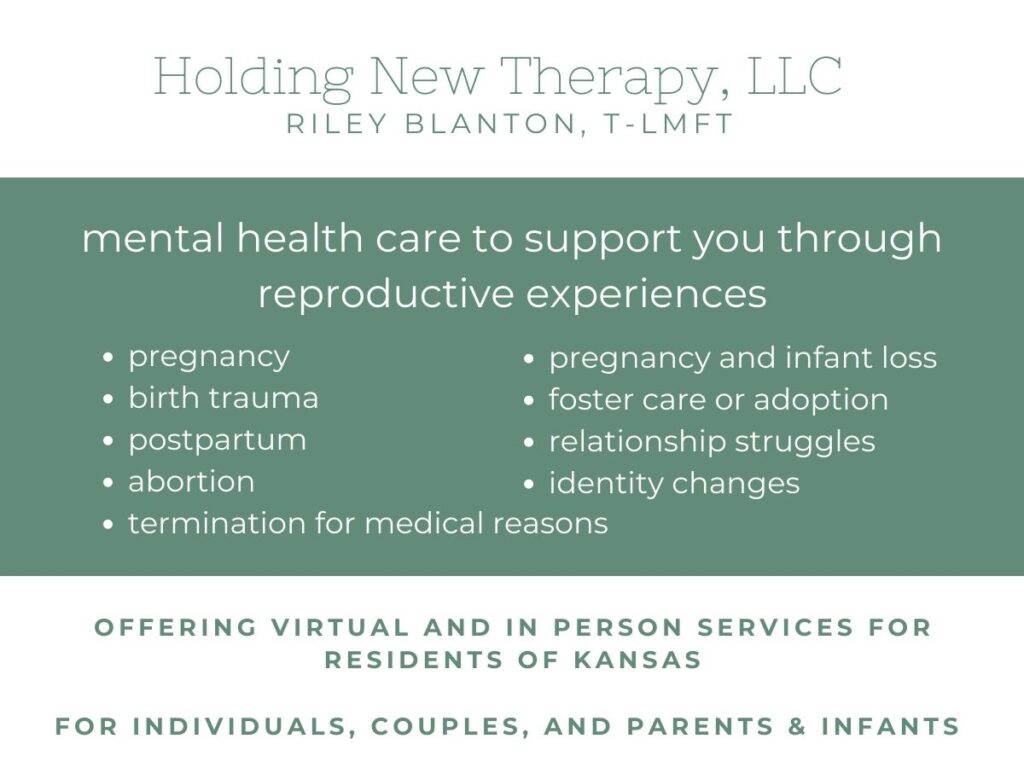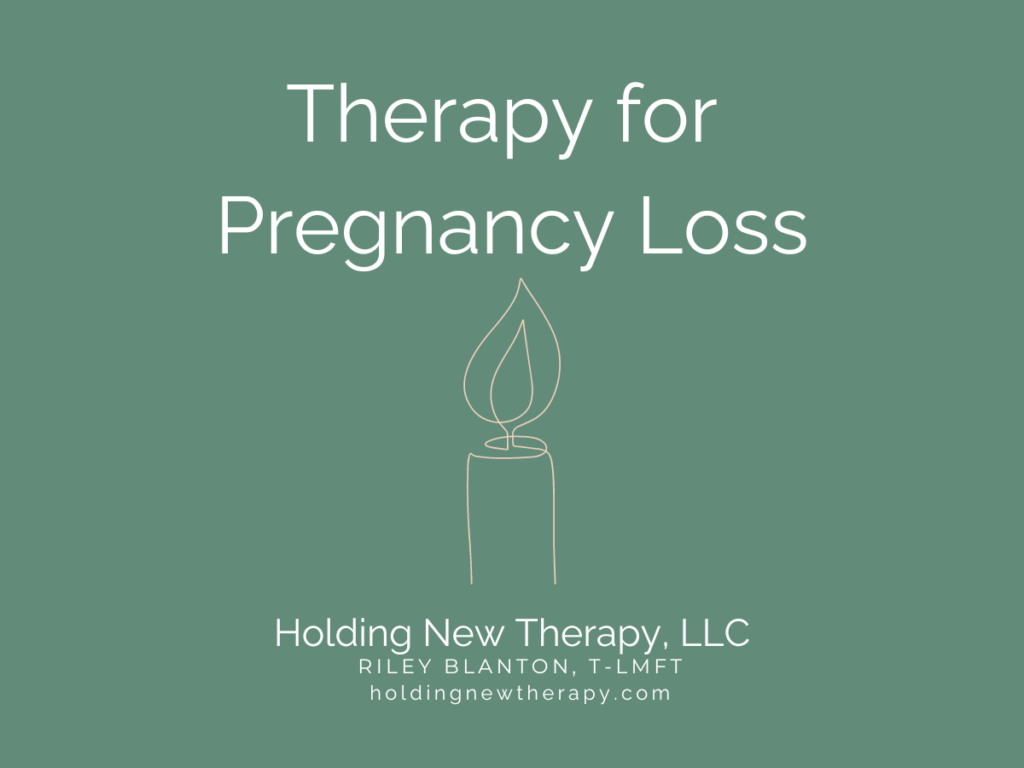Life after loss is never the same – no matter when the loss happens or what the circumstances are surrounding the loss.
You may feel like it’s impossible to move forward, or you might be avoiding any reminders of the pregnancy.
An estimated 20% of pregnancies end in miscarriage with 1% of pregnancies ending in stillbirth1. This isn’t to add fear to the dialogue, but to show you, you aren’t alone.
Individual and/or couples therapy could be beneficial during this time as you grieve your baby and your hopes for the future. Read on to discover how counseling helps after pregnancy loss, or click here if you are in the state of Kansas and ready for therapy.

What does perinatal loss mean?
Perinatal loss refers to the death of a baby during pregnancy or shortly after birth. This is often unexpected and sudden, including ectopic pregnancies, miscarriages, stillbirths, and infant deaths from SIDs or underlying causes.
At any stage, a loss is worth grieving. It doesn’t matter if it was a missed miscarriage after 7 days or a stillbirth. The loss and grief is impactful.
How does counseling help with miscarriage or pregnancy loss?
Attending therapy after a miscarriage or ectopic pregnancy can help you by1:
- Process through anger, sadness, relief, fear, and any other emotion you might be experiencing after this loss
- Develop coping mechanisms for symptoms of depression, anxiety, or trauma2
- Identifying activities you once enjoyed in order to cope with your sadness or grief
- Building a support network
- Offering a place to unpack the weirdness of grief, how its not linear, how it looks different for everyone, including those close to you
- Moving away from self-blame if you were the pregnant person
- Vent about feeling envious or jealous of those around you who are experiencing pregnancy and birth
- Work through attachment issues that might appear in pregnancy after loss
- Re-connecting your mind and body at a time when you might be angry at your body
- Discuss the nuances of your grief within your relationship through couples therapy
- Understand each other’s coping mechanisms through grief in couples therapy
- Allow you to grieve as the non-pregnant partner and process through the complex emotions of being the non-pregnant partner
Although pregnancy loss is talked about more on social media, often the experience is isolating. You deserve support by a professional who is trained in the depths of perinatal loss. Grief is not a linear process, especially when it comes to your baby. I have extensive training in treating perinatal loss, and I look forward to sitting alongside you as you grieve one step at a time.
How does counseling help with infant loss?
Therapy after a stillbirth or infant loss can benefit you by:
- Providing a safe place to sit in your grief as often as you need to
- Developing and participating in a ritual to honor your baby or the anniversary of your loss
- Coping with the anxiety, worry, or panic that might come alongside infant loss
- Building a positive support network around you
- Working through the numbness that might accompany loss
- Preparing for the funeral, holidays, birthdays, anniversaries, or other days that remind you of your loss – no matter how long ago the loss was
- Reconnecting yourself with your body as you cope with potential dissociation, numbness, muscle tension, sweating, nausea3
- Processing fear as you move towards trying to conceive again
- Learning how to grieve with your partner in couples therapy even if you experience the loss differently and cope with it differently
You might experience one, some, or all of these symptoms if you’ve experienced a loss. Either way, you deserve to seek help to process these feelings and move towards healing.

Why is support important after pregnancy or infant loss?
Finding pregnancy loss support is essential to healing. This could be in the form of a therapist, a partner, family and friends, a support group, an online community, or through books and social media accounts.
Support after pregnancy or infant loss can help you step outside of your own thoughts. The people around you can remind you that the loss was not your fault, that you are not alone in grieving, and that you have every right to experience the emotions you feel.
How do I find a perinatal loss therapist near me?
Pregnancy loss or the loss of an infant is not a “normal” grief experience. You might already have a deep connection with the baby, seeing them as an extension of yourself. Or you might blame yourself or your body more deeply as the pregnant person.
Because of this, it is imperative to find a therapist who specializes in perinatal loss. Postpartum Support International has a wonderful provider directory of professionals certified in perinatal mental health. It is important to understand the provider’s credentials, specializations, and trainings they have received in order to see if they are a good fit for you.
If you are a resident of Kansas, I would love to serve you via teletherapy sessions or in-person at our Wichita office. I have completed trainings specific to pregnancy and infant loss, such as Empty Cradle Broken Heart, and I would be honored to walk through this grieving period with you.
Kansas Therapy After Pregnancy or Infant Loss
Riley Blanton, LMFT-T is a therapist who specializes in treating individuals and couples who are trying to conceive, pregnant, postpartum, as well as those grieving a miscarriage, ectopic pregnancy, stillbirth, or infant loss. Riley offers sessions in her office in Wichita, KS or virtually through a secure video platform if you reside in the state of Kansas.

I see the value of incorporating the mind-body connection in therapy. After a loss, we might blame our bodies, disconnecting ourselves from them. This can lead to higher rates of dissociation, poor self-image, or sometimes, self-harm. How can we heal our minds if we do not include our bodies?
In the therapy room, this might look like incorporating grounding techniques to regulate your nervous system, practicing breathing strategies to focus on the present during flashbacks and racing thoughts, or introducing yourself to your new body – one that has experienced a trauma and deserves to be held.
Additionally, we might assess how you are talking to yourself (Are you blaming yourself for what happened?), what stories you are telling yourself (Saying this was supposed to happen? Convincing yourself you can’t have another baby?), as well as the effects of the loss on your life (How are your relationships? Are you able to function at work? What does grief look like for you?).
Grief is not predictable. It’s different for everyone and every situation. Together, we will develop your treatment goals and move you towards healing one step at a time – whatever that might look like.

If I am not the best fit for you, I’d love to send you some referrals and get you connected with someone who can help! You deserve to find support after a perinatal loss, and I’d be humbled to help you in that.
